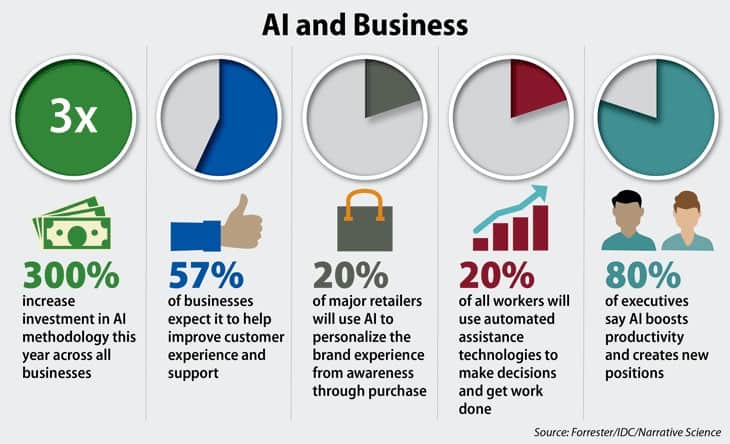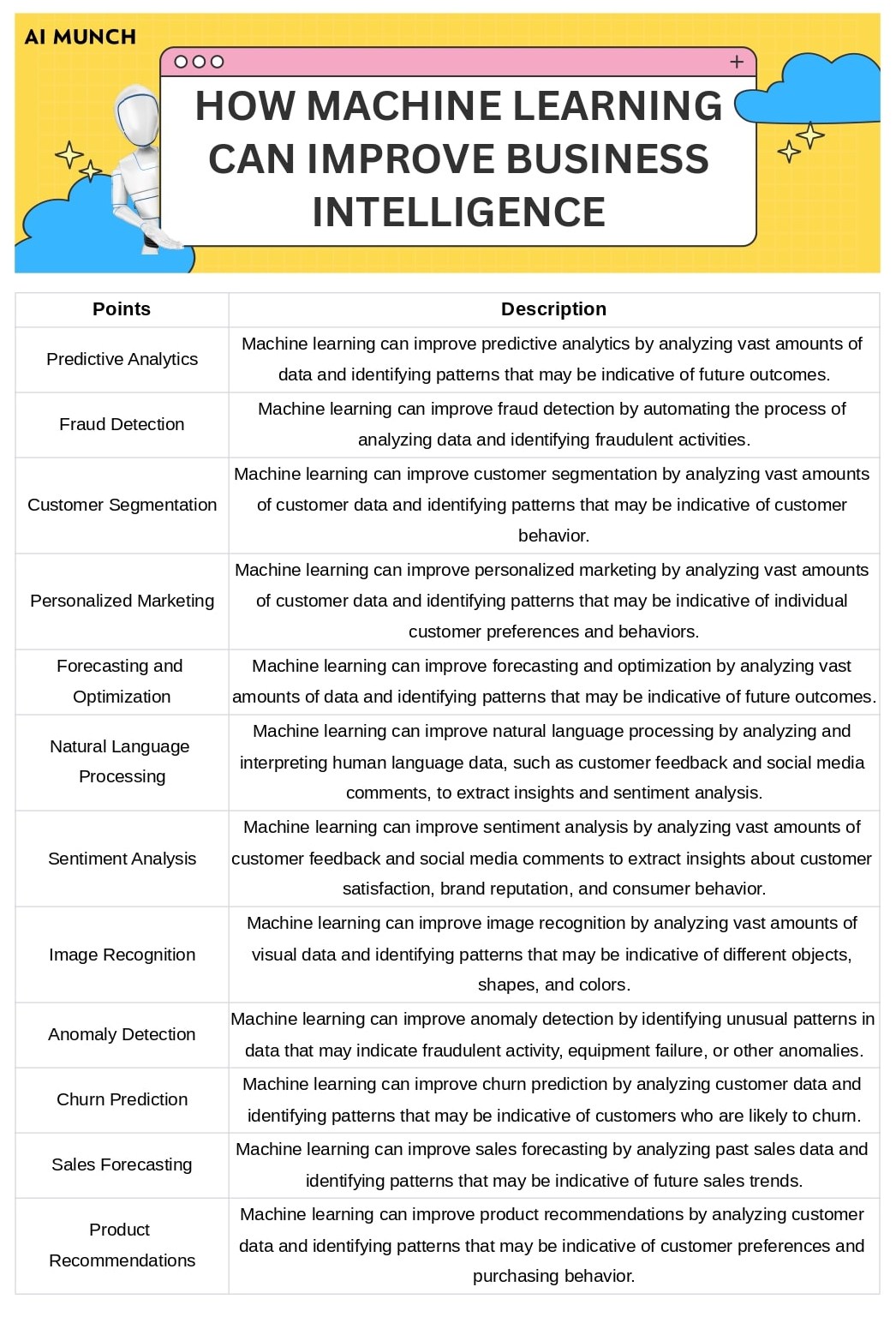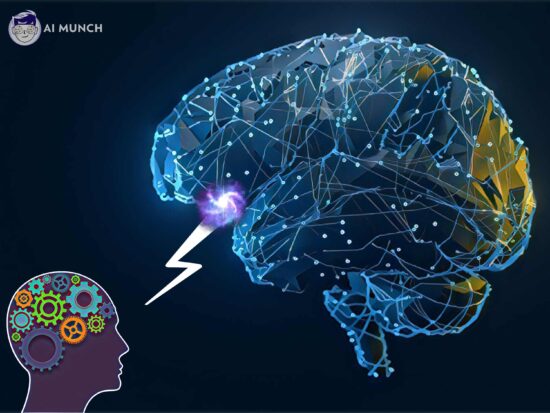I. Introduction
Before we dive into machine learning and business intelligence, let’s learn the basics. Machine learning is a branch of artificial intelligence (AI) that lets computers figure out how to do new tasks by looking at data without being told how to do them. On the other hand, business intelligence is all about gathering information to make intelligent business choices. Automating tasks, spotting patterns, and gaining insights that can guide decision-making are just some of the ways machine learning is used to improve business intelligence. You can read here if you want to know why AI is required in machine learning.
Importance of machine learning in business intelligence
Strong AI and weak AI both help in business intelligence. Companies make more data than ever, and this growth rate is expected to continue. IDC predicts that by 2025, global data production will total 175 zettabytes. Because there is so much data available, it is becoming more and more challenging for businesses to gain valuable insights from it. Machine learning can look at this data and find functional patterns and insights to help business owners. This has the potential to boost productivity, raise income, and cut expenses for a company.

II. Predictive Analytics
A. Definition of predictive analytics
Predictive analytics uses data, statistical algorithms, and machine learning techniques to determine how likely future events are based on what we already know. Its use in trend prediction, pattern recognition, and insight generation can aid businesses in making sound choices.
B. How machine learning improves predictive analytics in business intelligence
Machine learning can enhance predictive analytics, which streamlines data analysis and pattern recognition. It takes a lot of time and effort from humans to use traditional predictive analytics methods like finding patterns and making predictions. On the other hand, machine learning algorithms can sift through mountains of data in search of ways humans would have difficulty seeing. This has the potential to result in more reliable forecasts and wiser choices. Machine learning can forecast product demand, find high-value customers, and even predict if a customer will leave a business. McKinsey found that companies using predictive analytics saw a 20% increase in revenue and profit margins compared to their competitors.
III. Fraud Detection
A. Definition of fraud detection
AI is being used in the security and finance sectors. Fraud detection is looking for and stopping fraudulent activities within an organization. Fraud can appear in many ways, such as financial fraud, identity theft, and cybercrime. Fraudsters often change their plans to avoid being caught, making it hard to spot their actions.
B. How machine learning improves fraud detection in business intelligence
Machine learning can automate the data analysis process to detect fraudulent activities better. Most of the work needed to keep rules-based systems up-to-date and accurate is done manually. But machine learning algorithms can sift through mountains of data, searching for clues to possible fraud. As a result, fraud may be uncovered more effectively, and the company’s financial losses mitigated. With the help of machine learning, you can find things like credit card fraud, insurance scams, and mistakes in medical billing. The Association of Certified Fraud Examiners found that businesses lose an average of 50% less money when they use data analytics to find and stop fraud.
IV. Customer Segmentation
A. Definition of customer segmentation
To segment customers, you put them into groups based on their demographics, buying habits, and other personal preferences. Businesses can use this information to learn more about their clients and improve their marketing and sales strategies.
B. How machine learning improves customer segmentation in business intelligence
By looking at a lot of customer data, machine learning can find patterns that could be used to predict customer behavior. This makes customer segmentation better. Using this method, businesses can better target their advertising and sales efforts to customers with common characteristics, such as demographics or buying habits. Customers can be grouped based on their online activities, social media profiles, and shopping preferences, which can be learned from machine learning data. McKinsey found that when businesses used customer segmentation to tailor their marketing and sales efforts, customer satisfaction increased by 10%, customer retention by 10%, and marketing effectiveness by 30%.
V. Personalized Marketing
A. Definition of personalized marketing
AI marketing is getting trendy. Ceratin chatbots, such as Mitsuku (Kuki AI) and Xiaoice, are helping many businesses. Personalized marketing means making unique promotional materials and experiences for each customer based on their tastes, habits, and past interactions with a company. As a result, marketing messages may become more exciting and personal to the people who get them, which may increase sales and brand loyalty.
B. How machine learning improves personalized marketing in business intelligence
Machine learning can help make marketing more personalized by sifting through huge amounts of customer data to find patterns that point to specific preferences and actions. Businesses can now tailor their marketing to each customer so that they can reach them better. For example, machine learning can suggest products or services to customers based on what they’ve bought, how they act online, and other personal information. Epsilon found that open rates for marketing emails increased by 29% and click-through rates by 41% when personalized.
VI. Forecasting and Optimization
A. Definition of forecasting and optimization
This is something businesses are using artificial intelligence specifically for. Forecasting and optimization are methods of improving business processes and predicting what will happen in the future through the use of data and statistical algorithms, such as in digital currency trading. This can aid companies in making better decisions and increasing productivity.
B. How machine learning improves forecasting and optimization in business intelligence
Machine learning can significantly improve forecasting and optimization by sorting through vast amounts of data to find patterns that indicate what will happen in the future. This can improve forecasts’ reliability and process optimization efficacy within companies. Machine learning can predict when equipment will break down, improve how the supply chain works, and indicate how much people will want to buy products and services. A McKinsey report found that businesses that use machine learning to improve efficiency could save 20%.
VII. Conclusion
A. Summary of how machine learning can improve business intelligence
When used for business intelligence, machine learning can speed up processes, spot trends, and give insights that can be used. Their use bolstered predictive analytics, fraud detection, customer segmentation, personalized marketing, forecasting, and optimization.

B. Future of machine learning in business intelligence
Artificial intelligence has a promising future in the field of business intelligence. As businesses make more data than ever, the need for advanced analytics and machine learning will continue to grow. Grand View Research predicts that, the worldwide machine-learning market will be worth $96.7 billion by 2025 and $117.19 billion by 2027. As machine learning algorithms get better, it is expected that businesses will be able to get even more out of their data, leading to better overall operations, more sales, and lower costs.
FAQs
Machine learning is used by business intelligence to sort through vast amounts of data to find insights that can be used. It can improve things like natural language processing, sentiment analysis, image recognition, anomaly detection, churn prediction, sales forecasting, product recommendations, and predictive analytics.
Businesses can benefit from machine learning in several ways, including through data analysis automation, identifying patterns and trends, enhanced decision-making, optimized business processes, improved customer experience, increased operational efficiency, decreased costs, and increased revenue.
By automating data analysis, spotting patterns and trends that humans might overlook, boosting decision-making, optimizing business processes, and enriching the customer experience, artificial intelligence, and machine learning can improve business intelligence. When this occurs, productivity rises, expenses decrease, and earnings increase.
Using cutting-edge technologies like machine learning and artificial intelligence can improve business intelligence by automating data analysis, getting insights, optimizing business processes, and improving the customer experience. Another way to boost efficiency is to make sure the correct data is being collected, analyzed, and presented in a helpful way to the company.
The success of business intelligence depends on some things, such as the quality and usefulness of the data collected, the accuracy of the analysis and insights, the availability of data-driven decision-making, the efficiency with which business processes can be optimized, and the quality of the customer experience.
By streamlining and optimizing data analysis, business processes, and customer service, business intelligence helps companies save time and money. When this occurs, productivity rises, expenses decrease, and earnings increase.
There are several reasons why businesses should implement business intelligence,
including:
A) Making informed decisions based on data-driven insights
B) Improving operational efficiency and reducing costs
C) Enhancing customer experience
D) Optimizing business processes
E) Increasing revenue and profitability.
Do you want to read more? Check out these articles.











7 comments